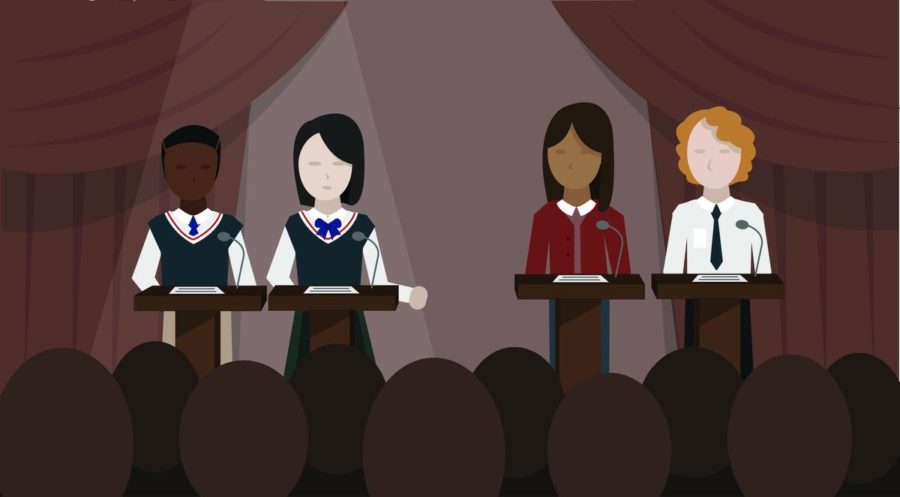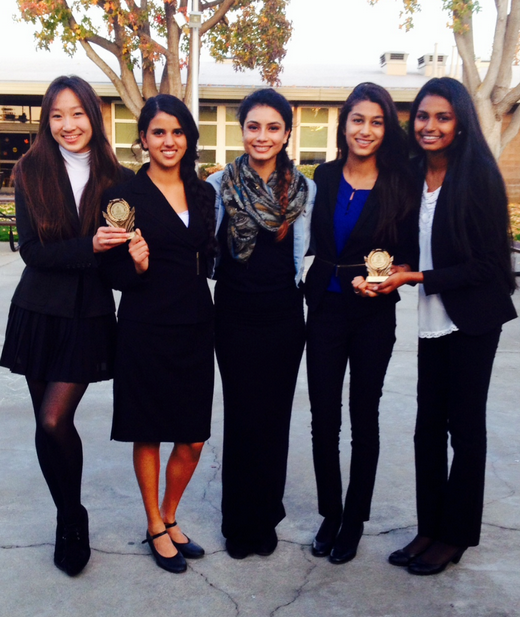High school debate obscures the true issues
High school debate encourages teens to sensationalize certain issues while devaluing others, an alarming trend in an activity meant to promote a better understanding of the world.
April 4, 2023
Recently, in a debate round, my opponents read an argument about how unions increase wages for women and thereby close the gender wage gap. As a response to this, I talked about how unions perpetuate sexual harassment, which should always be prioritized over any economic benefit since this harassment dehumanizes women. Instead of trying to contest the validity of the argument about unions causing sexual harassment, my opponents decided to say that increasing wages is more important than addressing sexual harassment. No explanation was given for this claim other than blatant assertions.
This goes to show how morality and ethics fly out the window when it comes to debating. Instead, debaters just make whatever argument they think can to help them win the round, regardless of whether it is true in the real world or not.
This is perpetuated by the fact that debaters are restricted from expressing their true opinions on topics they are debating about. While their values might strongly align with one side of a resolution, they will inevitably be forced to argue on both sides of the topic, which forces them to advocate for ideas that they may believe are fundamentally false or even harmful.
However, the most openly egregious method of lying in debate is undoubtedly the exaggeration of impact numbers. Debaters always look for bigger and bigger numbers of how many people are affected through their arguments. One million deaths? That’s nothing. Most debaters would prefer to debate about a nuclear war that causes extinction. After all, that’s what would be more appealing for the judge to vote for.
To the common person, it may seem like nuclear war has no chance of actually occurring and therefore would not be a great debate argument. It may come as a surprise that nuclear war is one of the most common impacts that debaters read on virtually any topic, regardless of whether or not it makes sense in that context. By engaging in such argumentation, debaters often ignore the implications that come with such claims. Not only are many of these arguments illogical and often laughable, but it is also just insensitive, if not inhumane, to try to link genetically modified organisms to a nuclear war – yes, this has happened before.
This insensitivity applies not only to nuclear war impacts, but other arguments that have a severe impact on anyone as well. One time, I read an argument about the genocide of a specific ethnic group that occurred in the past and read evidence saying there is a high likelihood of such a genocide occurring once again without Turkey’s involvement in NATO. I didn’t realize the detrimental effect that such an argument could have on someone who was part of this ethnic group until it was pointed out to me in a debate round. “Don’t you think it’s inconsiderate to tell a certain ethnic group that another genocide of their people is going to occur?” I was asked by an opponent. While that had not been my intention when I created the argument, I realized that they were right in asking that question. This goes to show how unethical behavior in debate doesn’t necessarily reflect poorly on the character of the person reading those arguments, but rather on the nature of the activity as a whole.
Debate was created as a way for students to expand their knowledge about major issues in the world, but it has shifted away from that towards just making arguments that your opponents wouldn’t know how to respond to, regardless of how untrue those arguments may be. Debate shouldn’t be a game about who can lie the best and get away with it; it should be about spreading education and awareness about important topics.
In debate, if an argument is “dropped” by your opponent, which means it goes unaddressed in the speech immediately after it was first introduced, that argument is considered to be one hundred percent true for the purposes of the round. It doesn’t matter what the argument is. You could be saying something as crazy as “unemployment leads to a war between Russia and China”, and as long as you read enough other obscure arguments like that one so that your opponent wouldn’t have time to respond to all of them, you win.
In order to accomplish this feat of reading so many arguments that your opponents miss one, many debaters adopt the practice of spreading, which is short for speed reading. When spreading, debaters can be speaking as fast as 300 words per minute. For context, the average conversational speed is about 60 words per minute, meaning that spreading is completely incomprehensible to a normal person. Even most debaters and judges can’t follow this speed, so debaters often send a doc with their entire speech on it to everyone when they’re planning to spread.
Think about it. Debate is supposed to cultivate the next generation of policymakers. But, how does reading as fast as you can to overwhelm your opponents prepare you for the real world of politics? It doesn’t.
Such practices in debate extend to the political world as well. Instead of engaging in open-minded discussions, politicians often just attempt to tarnish their opponents’ reputation or force them into submission. Debate demonstrates how language can be abused in order to morph the truth in your favor. This thereby introduces the idea that politicians don’t necessarily need to support what is right. They can support any stance as long as they can adequately lie about it.
All of this is not to say debate does not come with any educational benefits. The diverse topics I have debated on during my time participating in this activity has vastly widened my perspective on the world by forcing me to think about issues in ways I wouldn’t have considered them before. Debate has made me more open-minded and more knowledgeable about all types of affairs in the world.
However, it is important to acknowledge how instead of educating students about world issues, debate rewards the spreading of false information in an overwhelming manner, which causes such methods to be implemented in the political system as well. Debaters, coaches and judges alike need to recognize the true purpose of the activity and work to achieve the full educational potential of debate.




